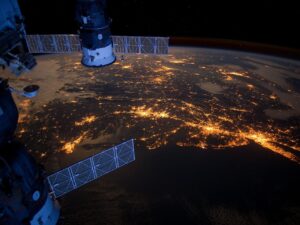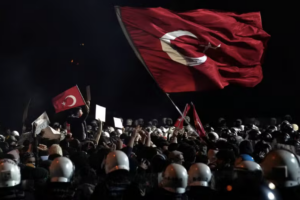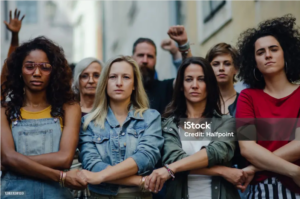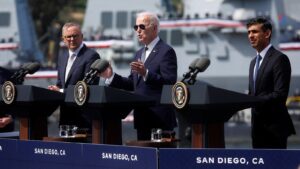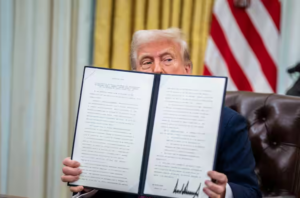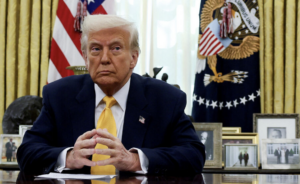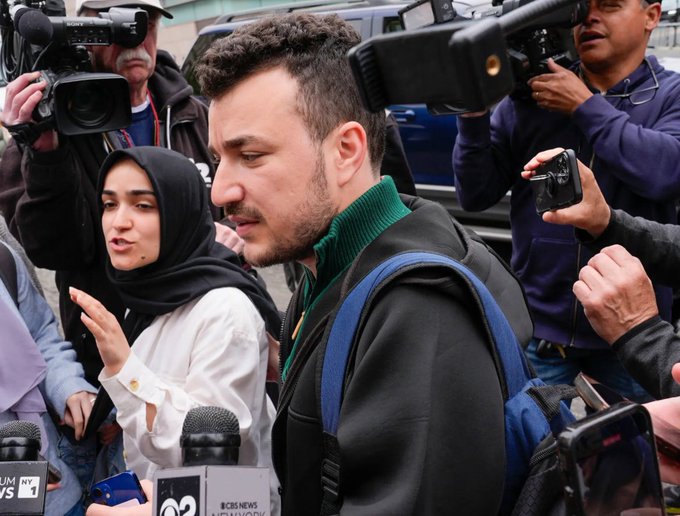Who is Mahmod Khalil
First of all, Mahmoud Khalil, a graduate of Columbia University, was one of the leaders of campus protests. Last year, Khalil was the lead negotiator for the Gaza solidarity camp at Columbia University. He acted as a mediator between pro-Palestinian protesters and the university administration last spring.
The U.S. government has issued a charge against him, as he is a permanent resident with a green card. The government is using a rarely applied provision of the law to try to deport him. Green cards are rarely revoked without a criminal conviction. However, the government argues that Secretary of State Marco Rubio “has reasonable grounds to believe that Mahmoud Khalil’s presence or actions in the U.S. could have potentially serious consequences on U.S. foreign policy.” This foreign policy provision is the only reason for deportation mentioned in the document.
Khalil’s arrest
Indeed, Khalil was arrested in front of his wife, who was eight months pregnant. She issued a statement the evening after his arrest by Immigration and Customs Enforcement (ICE) in New York. His wife said, “I urge the world to continue to condemn his unjust and horrible detention by the Trump administration.” She also mentioned that no warrant was presented and that ICE agents hung up on their lawyer. The police officers handcuffed Mahmoud, took him to the street, and forced him into an unmarked car.
Moreover, Donald Trump called Khalil’s arrest “the first of many” targeting protesters against the Israel-Gaza war. He claimed, without evidence, that many similar activists are “paid agitators.” He described Khalil as “a radical foreign student pro-Hamas” on his Truth Social platform.
It is important to note that Trump had already planned to expel students who participated in protests against the Israeli-Gaza war on U.S. campuses last year.
Is it really easy to revoke a green card? Is Donald Trump’s decision a violation of free speech?
Second of all, Khalil’s lawyer, Amy Greer, told Time magazine that Khalil had committed no crime nor violated his residency conditions. She also said Khalil was targeted because of his political activism and opposition to Israeli policies. Khalil stated to CNN last year, “As a Palestinian student, I believe that the liberation of both the Palestinian and Jewish people are closely linked, and you cannot achieve one without the other.”
Reasons for deportation can include committing crimes, participating in fraud, or being considered a threat to national security. Even in these cases, one can challenge deportation orders in court.
Sarah Leah Whitson, Executive Director of Democracy for the Arab World Now (DAWN), said, “Green card holders have the same First Amendment protections as U.S. citizens.”
What about the First Amendment?
Indeed, let’s take a closer look at the First Amendment. It states, “Congress shall make no law respecting an establishment of religion, or prohibiting the free exercise thereof; or abridging the freedom of speech, or of the press; or the right of the people peaceably to assemble, and to petition the Government for a redress of grievances.” This guarantees freedom of religion, meaning no law can establish an official religion or prohibit religious practice. It also guarantees freedom of speech, meaning citizens have the right to express themselves without government censorship. Additionally, it ensures press freedom and the right to assemble peacefully and petition the government.
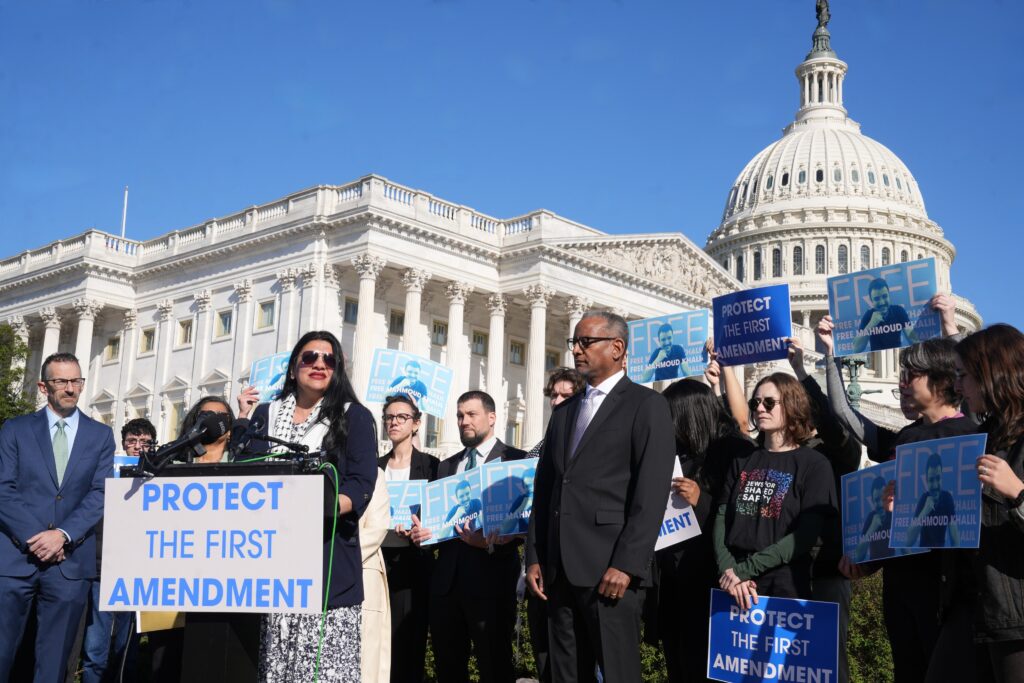
The US government
Now, the government must prove that Mahmoud Khalil violated U.S. immigration laws and represents a national security threat. The Department of Homeland Security claimed Khalil engaged in “actions related to Hamas,”. However, he has not been charged with any crime. Secretary of State Marco Rubio said the Trump administration “would revoke the visas or green cards of Hamas sympathizers in the U.S. to expel them.” Nonetheless, the authorities have not yet provided evidence that Khalil is a Hamas sympathizer.
Khalil is currently detained at the ICE processing center in Central Louisiana, in Jena. Jenin Younes, a civil liberties and free speech lawyer, said, “I suspect the government moved him to appear before a more conservative and favorable immigration judge. This also makes it harder for him to work with his lawyers, who are based in the New York and New Jersey area.”
Protests at Columbia University Campus
Indeed, since last year, a camp has been set up by students protesting for Washington to stop its unconditional support for Israel amidst the devastating war in Gaza. Several students have been arrested, and protesters have faced accusations of antisemitism. The protests condemned Israeli military actions in the besieged Gaza Strip. Additionally, it called for divestment from companies linked to illegal Israeli settlements on Palestinian land. Students demanded the university cut financial ties with organizations related to the Israeli government and its defense industry. Since Khalil’s arrest, the movement has evolved, now calling for his release. Protests have been held in New York demanding his freedom. Over 2.7 million people have signed a petition demanding Khalil’s release.
Is Free Speech Under Threat in the U.S?
First, during an interview aired Thursday with NPR’s Michel Martin, DHS’s newly confirmed second-in-command, Troy Edgar, wouldn’t even say whether criticism of the government was a deportable offense. ICE acting director Tom Homan comments on arrest of Mahmoud Khalil, saying “ free speech has limitations”.
Then, if the U.S. government succeeds in deporting Khalil, it will be “a harbinger of unprecedented authoritarian repression against political free speech,” said Younes. U.S. Congresswoman Rashida Tlaib has called for Khalil’s immediate release.
“We must be very clear: this is an attempt to criminalize political protest and a direct attack on everyone’s free speech in this country,” said an open letter signed by 13 lawmakers, including Tlaib.
Conclusion
In conclusion, Mahmoud Khalil’s case raises critical questions about the intersection of free speech. But also political activism, and immigration policy in the United States. His arrest and potential deportation highlight the growing tension between government actions and the fundamental rights. Those rights are guaranteed by the Constitution, particularly the First Amendment. As protests continue and support for Khalil’s release grows, his situation serves as a reminder of the importance of protecting political dissent and ensuring that all individuals, regardless of their status, are afforded the right to freely express their views. The outcome of this case could set a concerning precedent for the future of political expression and civil liberties in the U.S.


